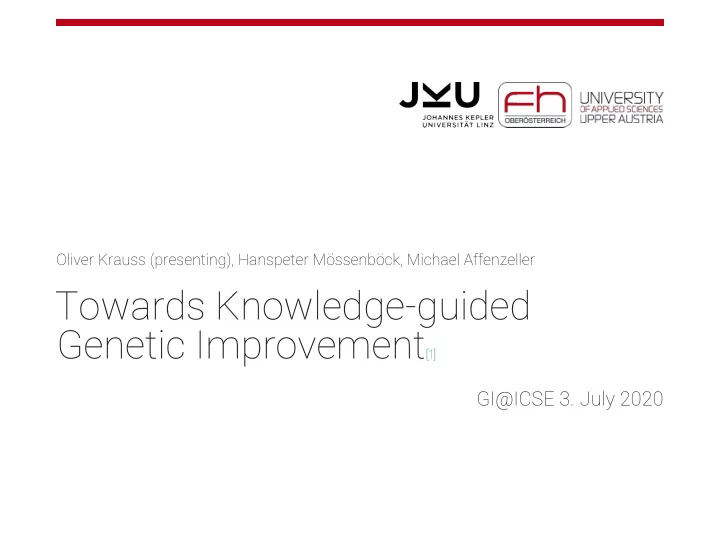

Oliver Krauss (presenting), Hanspeter Mössenböck, Michael Affenzeller Towards Knowledge-guided Genetic Improvement [1] GI@ICSE 3. July 2020
Abstract -- Grammar-guided Genetic Programming -- Tree-based Genetic Programming -- combined into Knowledge-guided Genetic Improvment Page 1 | 7
Introduction Grammar-Guided Genetic Programming GGGP [2] -- Utilizes grammar to create syntactically correct individuals -- Oiginally crossover operator Tree Genetic Programming (TGP) -- Utilizing tree structure, often Abstract Syntax Tree (AST) -- Enable operators, ex. homologous crossover [3] -- Previously Combined into Tree-adjunct Grammar Guided Genetic Programming (T3GP) Page 2 | 7
Knowledge-guided Genetic Improve- ment -- AST based representation form -- Grammar that ASTs adhere to -- Grammar enriched with metadata -- Operators can access context Page 3 | 7
Syntax Graph Figure: Syntax Graph for generating syntactically correct ASTs Page 4 | 7
Proposed Impact Benefits -- Increased amount of valid ASTs . -- Not just syntactically correct but also semantically executable -- Metadata enables complex operators and fitness function approximation -- Syntax Graph can be pruned or redirected to reduce execution errors Drawbacks -- Mining metadata is complex and expensive . -- Complex operators cost run-time performance -- Mistakes in the syntax graph endanger validity of experiments Page 5 | 7
Conclusion and Outlook -- Metadata in syntax graph especially useful for Genetic Improvement -- Approach shows promise -- Amount of compileable ASTs is at 100% -- Amount of executeable ASTs is "very high" -- Upcoming empirical evaluation -- to put a number to "very high" -- Does the approach improves overall quality in individuals? -- Does it increase success rates in experiments? Page 6 | 7
Questions? Oliver Krauss Johannes Kepler University Linz University of Applied Sciences Upper Austria Oliver.Krauss@fh-hagenberg.at http: // aist. fh-hagenberg. at Page 7 | 7
Bibliography I [1] Oliver Krauss, H. Mössenböck, and M. Affenzeller, “Towards Knowledge Guided Genetic Improvement”, in 2020 IEEE/ACM International Workshop on Genetic Improvement (GI) , Oct. 2020. [2] D. Manrique, J. Rios, and A. Rodríguez-Patón, “Grammar-Guided Genetic Programming”, in Encyclopedia of Artificial Intelligence , 2009. [3] F. D. Francone, M. Conrads, W. Banzhaf, and P. Nordin, “Homologous crossover in genetic programming”, in Proceedings of the 1st Annual Conference on Genetic and Evolutionary Computation - Volume 2 , ser. GECCO’99, Orlando, Florida: Morgan Kaufmann Publishers Inc., Jul. 1999, pp. 1021–1026. Page 1 | 1
Recommend
More recommend